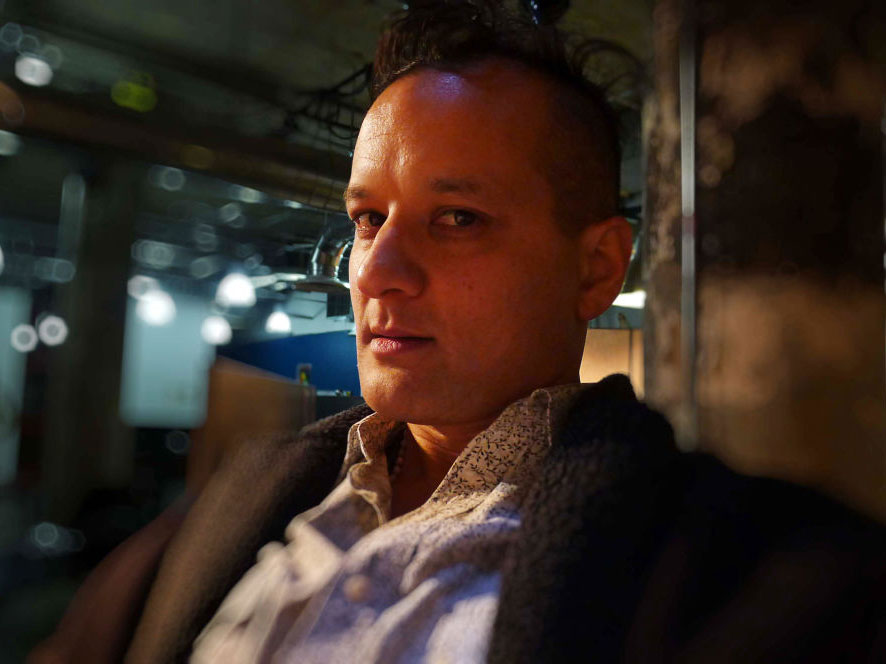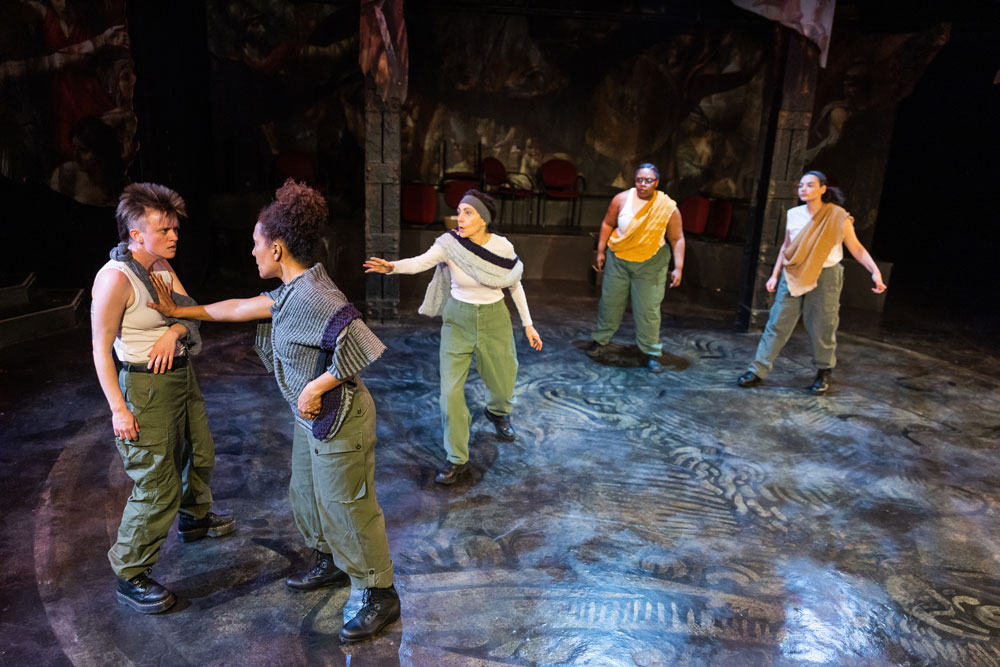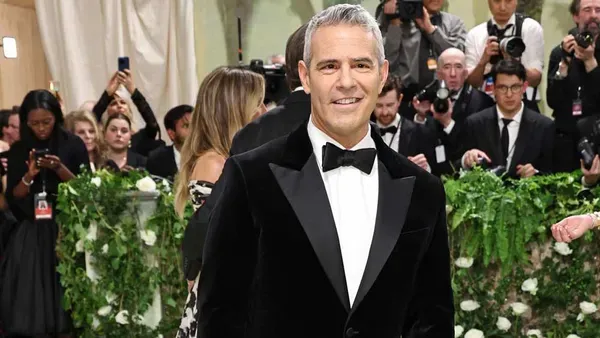
April 3, 2023
Sean San José Updates Shakespeare's 'Coriolanus' for Today's World
Kilian Melloy READ TIME: 8 MIN.
When the Play On Shakespeare initiative reached out to San Francisco-based queer theater maker Sean San José with an offer to take part in their effort to update the plays of Shakespeare with modern language "translations" of the Shakespearean canon, José – a co-founder of Campo Santo, which produces work intended to question and challenge, and now the first person of color to serve as artistic director for the revered Magic Theatre – had his doubts.
"I probably, of all the Play On roster of writers, maybe am the least connected and least interested in Shakespeare per se, insofar as I can recognize it is great poetry and even drama, but it certainly had no resonance to the layers that I had to step through in order to make a direct connection to it," San José explained. "I'm so impatient about when I experienced something. It took too long."
But when he thought it over, San José decided that undertaking a modern language translation of Shakespeare could help take the play out of its historical and linguistic remove and place it firmly in the world we live in now. The play he chose to put into contemporary English is "Coriolanus," the story of a Roman general whose populism made him a favorite of the people, but whose expertise on things military rather than political presented a whole new set of problems. (Sound familiar?)
Bringing San José's take on "Coriolanus" to Boston – and bringing the playwright himself all the way across the country – is Actors' Shakespeare Project, which will present the play with a diverse, all-female/nonbinarycast, in a production helmed by A. Nora Long.
Sean San José chatted with EDGE about updating and translating Shakespeare's English into our own and making the timeless story part and parcel of our own current American moment.

EDGE: Coverage of your becoming the Magic's artistic director rightfully acknowledged that you're the first person of color to hold that position with the theater, but you're also a queer theater maker. Is centering theater projects on the LGBTQ+ experience also a focus for you?
Sean San José: Yeah, absolutely. In all the work that I've done, it's not just about centering people, it's about reflecting the world that we live in. And the world that I live in very specifically is full of so many people, types, cultures, histories that are not represented on our stages and stories. And, especially, being from the San Francisco Bay area, it's not only my family and my neighborhood, filled with immigrants and people of color, but this is our gay mecca and gay pride and gay rights, so absolutely it's about that.
EDGE: Do you do you see this updating of the language of "Coriolanus" as an extension of your efforts to be more inclusive in theater?
Sean San José: Absolutely. The word "translation" has been beguiling, confounding, and also, I think of it more expansively insofar as the Play on Shakespeare initiative was to update the language, have the language be able to be understood in a more immediate way than sometimes Shakespeare can for people like me, where either I'm missing something or it takes me a while to wrap my head around it.
In no way is [this translation meant] to simplify or dumb it down. The actual task was to translate it, without removing, adding, editing, cutting – but rather, to work with the language and adjust it. In that sense, "translation" made perfect sense.
In terms of how it relates to the work I do, I imagined this language being spoken and embodied by people of our world, which are not the same people that are in most of the Shakespeare presentations – which is to say, people of color; which is to say, a predominance of women; which is to say, any actual queerness on stage.

EDGE> As you just mentioned, the diverse cast for this production is all-female/nonbinary. What sort of storytelling possibilities does that open up?
Sean San José: Mostly, for me, it's about embodiment and presentation. I always had imagined women [in the play], because I also wanted to hear the words and the arguments void of our preconceptions of who creates violence, who creates war. So, I was much more interested in posing the arguments and the questions a little more openly. We're not going, "Oh, we're gonna flip the genders, and this is about gendering." We're saying, "What is the argument here? What is the sense of populism, and who has the power?"
I was raised by women, so to enter these profound, beautiful, dramatic worlds of Shakespeare, [where] there'd be, like, one woman, and she comes in for one thing [and then she's gone again], I was just like, "I know this must be like a made-up world. I don't understand this world as it relates to the real world." The idea that the world be populated by female-presenting bodies and non-binary bodies made much more sense to me. I want to be part of presenting a Shakespeare world that is leading with the people that I feel lead in the civic cultural life of the actual world.
EDGE: So your question is more, "What does this approach draw from the text?" rather than, "What can I pour into the text?"
Sean San José: Yeah, exactly. My job was to present a text in how I imagined the world is framed. Let's see if we can invest and explore and unearth something that hasn't been seen before. It isn't about saying, "I have all these ideas of embodying women and non-binary bodies" – no, that's the framing. It'll be interesting to see how that's interpreted, both by the company, but more so by the audience.

EDGE: I don't know if there's a Shakespeare play that's more relevant to what's happening in America today than "Coriolanus." How much of what's going on right now became a lens for this new version?
Sean San José: It's something that I hadn't consciously thought of, and it was something that the head of Play On, Lue Douthit, pointed out to me pretty early on. We had started this project and the initiative prior to that horrible election [in 2016], and so that more overt connection was never in my consciousness. But what was in the consciousness – and probably why I chose "Coriolanus" – was the more general idea of populism and power versus people. It's been maddening, and also beguiling and interesting, to follow a character like Coriolanus – meaning a character that holds no love for the so-called common people, and yet, in the next breath, is completely transparent and honest. Someone that isn't built for politics, but is thrust into politics. There's a sort of ambition/lack of ambition. That really drew me.
EDGE: You're also an AIDS activist. How does that inform – or is informed by – your work in theater?
Sean San José: "AIDS activist" feels too complimentary of me. I'm a person that is just affected by the epidemics that I've lived through. I think AIDS has certainly affected all of our lives, and as someone who grew up and lived through two epidemics, I feel very affected by both the AIDS epidemic and the crack epidemic to this day. I think it informs my work insofar as what I believe in, and what I care about.
The AIDS work was really to put a human face to something that had become just a horror story in so much of our media. When I started doing stuff like that, it was at a time when theater stuff, outside of something monumental like Tony Kushner's "Angels in America," was a lot of symbolic AIDS: There was a ghost, there was a notion. I personally didn't feel like I was getting any closer to being able to engage with this epidemic if I was thinking of it symbolically, rather than, say, "That's your neighbor; that's the person that serves your breakfast in the morning; that's your cousin." To see the human face – that's what theater can do so well. Put us all in the same room and remind us for that hour or two hours [that] we're actually all in the same world together.
It started there, and I think that that remains in there, this notion that we can bring things to the forefront that are happening in our real world, more than saying, "I figured out this way of dealing with gun violence, and I'm going to present the story about that." I think the morals [of the stories] are for us to know and live with; it's the conundrums that we want to present and experience in communion together.
The Actors' Shakespeare Project presents "Coriolanus" March 29 – April 23 at the Plaza Theatre at the Boston Center for the Arts. For tickets and more information, follow this link.
Kilian Melloy serves as EDGE Media Network's Associate Arts Editor and Staff Contributor. His professional memberships include the National Lesbian & Gay Journalists Association, the Boston Online Film Critics Association, The Gay and Lesbian Entertainment Critics Association, and the Boston Theater Critics Association's Elliot Norton Awards Committee.







